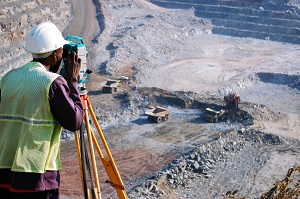 Beyond the “resource curse”: the need for strengthened resource management in Africa
Beyond the “resource curse”: the need for strengthened resource management in AfricaThe earliest evidence for mining in the world dates back over 40,000 years ago in Swaziland in Africa. Richly endowed with oil, gas and mineral resources, Africa ranks either first or second in resources of many raw materials such as bauxite, chromite, cobalt, industrial diamonds, manganese, phosphate rock, platinum-group metals, rutile, soda ash, and zirconium. Almost 30% of global oil and gas discoveries made over the last five years have been in sub-Saharan Africa.
However, the abundance of mineral and petroleum resources in Africa has failed to deliver socio-economic benefits to its people. “Resource curse” is the sentiment often associated with the mineral and oil wealth of Africa. Efforts to make a structural transformation in the region received a boost in 2009 when the Africa Mining Vision (AMV) was unveiled. This is a shared vision that aims for the transparent, equitable and optimal development of Africa’s natural resources to underpin broad-based sustainable growth and socio-economic development. The African Mineral Development Centre (AMDC), hosted by the United Nations Economic Commission for Africa (UNECA) in Addis Ababa, Ethiopia, is mandated to implement this vision.
No country in Africa currently has a comprehensive resource management system. With the exception of South Africa, no country in Africa has a code for reporting mineral and energy resources to stock exchanges and financial institutions, which is key if foreign investments are to be attracted.
UNFC to support enhanced resource management
To address this pressing gap, AMDC, with the support of UNECE, organized a workshop on “Harmonization, adaptation, implementation and development of the United Nations Framework Classification for Resources (UNFC) in line with AMV”, from 2–6 October, in Cairo, Egypt.
UNFC, whose development is led by UNECE’s Expert Group on Resource Classification, is a globally applicable system that provides a framework for the sustainable management of mineral, petroleum and renewable energy resources, facilitating the alignment of the production and utilization of these resources to the Sustainable Development Goals (SDGs).
“This was a landmark meeting for Africa. A dedicated group of experts have started work to develop a UNFC-based resource management system for Africa, the UNFC African Mineral and Energy Resources Classification and Management System, UNFC-AMREC,” said Kaiser de Souza of AMDC. “UNFC-AMREC will provide definitions, standards and guidelines for sustainable management of mineral, petroleum and renewable energy resources. It will include aspects such as technological maturity for attaining better social and environmental outcomes, including forward-looking goals such as zero waste.”
UNFC-AMREC will also integrate the first ever Pan-African Reserves and Resources Reporting Code (PARC), which will be designed as a game-changing unified stock exchange and financial reporting standard to spur growth in mining, petroleum and renewable energy investments in Africa.
Fostering the sustainable growth of Africa’s resource industries
The lack of a system such as UNFC-AMREC in Africa to date has impeded the stable and sustained growth of the resource industry. This also has led to reduced integration of policies, challenges in long-term planning, inefficient allocation of capital and missed opportunities in value addition. Moreover, the introduction of innovative technologies and building competencies in the professional and technical workforce have been neglected.
“With UNFC-AMREC as a system tailored to the unique requirements of Africa, especially to support good governance, timely and proactive decision making in resource development will become easier”, underlined Tunde Arisekola of the Nigerian Geological Survey Agency and Vice-Chair of the UNECE Expert Group on Resource Classification. “Integrated resource management policies and strategies, improved business process management for companies, and effective capital allocation are some of the benefits of having this system in place.”
“In the coming decades, Africa will transform into one of the most populated regions in the world,” said Professor Aberra Mogessie, University of Graz and Past-President of the Geological Society of Africa. “The oil, gas and the mining industry will benefit from a robust set of competent young professionals in Africa. UNFC-AMREC will support the development of a globally recognized and respected professional workforce through a force multiplier effect that links business process, gender justice and capability.”
Growing interest: UNFC can support sustainable development in all regions
The UNECE Expert Group on Resource Classification, which develops and maintains UNFC, will cooperate and support the development of UNFC-AMREC. “It is gratifying to see that the efforts we have been undertaking with UNECE member States to manage primary resources optimally is helping to attain the 2030 Agenda for Sustainable Development” remarked Scott Foster, Director, Sustainable Energy Division, UNECE. “I am pleased to see that our work is now being taken up in other regions. We stand ready to assist with dissemination, education and training on UNFC where needed”.
For further information on UNFC or UNECE’s Expert Group on Resource Classification, please visit: http://www.unece.org/energy/se/reserves.html and/or contact Hari Tulsidas at reserves.energy [AT] unece.org.

